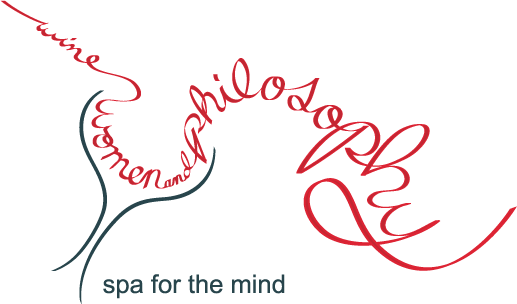"I want to race through life with the wind in my face!"
So exclaims the heroine in one of the many novels about daring-do women penned by renowned British "lady-explorer," Rosita Forbes (1890-1967). A worldwide wanderer par excellence, a prolific writer of both adventure-packed fiction and personal travelogues that read like fiction, Rosita Forbes and the fictional characters through which she expressed her hell-bent and windswept attitude to life would seem to epitomize the trope of the unleashed traveller. More than this, Forbes and her flamboyant alter-egos appear to fly in the face of the more sedentary and home-bound image we have of well-to-do Edwardian womanhood.
As wine women and philosophy members well know, however, anything that ruffles the feathers of the expected is likely to be given its fair due during the course of a wwp salon evening, and this past Thursday was no exception. Let's just say that in our race through the potentia and perils of unleashed travel, no stereotype was left unturned, no mappa mundi left untrammelled. And if a Spinozist wind was blowing a fine gale all around us, the knowledge that it was ultimately there to maximize our motile joy and minimize our all-too-static sorrow definitely propelled us along.
We began the evening with the usual etymological unpacking of key terms, though on this particular occasion it was more like an exercise in what to pack: determining just how much 'unleashing' - how much 'freedom from constraint or control' - each of us was willing to throw into our kit-bags as we struck out into uncharted territory; balancing the somewhat dubious weight of 'travel''s Old French and Latin roots (from travail - 'hard work' - and trepalium - 'instrument of torture') against the unbearable lightness of expeditionary expediency in the era of Expedia.
As if this didn't present departure gate dilemmas enough, we brought Gilles Deleuze and Rosi Braidotti on board: probing the difference between travelling arborescently (think the rooted family tree) and travelling rhizomatically (think crab grass with its web of sprawling and criss-crossing connections, disconnections and re-connections) courtesy of the former; dipping our toe into the swirling post-identity whirlpool of nomadic becomings and ethics courtesy of the latter. In addition to helping us understand the difference between tracing and mapping our way through the world, we couldn't help noticing how these thinkers' rejection of starting points and end points in favour of a fluid, always-in-the-middle sense of Self and Location resonated with Spinoza's call to develop 'the View from Nowhere' (see our first Spinoza session back in December 2012).
As for the actual mechanics of shedding those Spinozist 'passive markers' when travelling either physically or virtually, an exercise in writing ourselves into our own travelogues highlighted the difficulty of seeing our body as nothing more than a force entering into fleeting composition (and decomposition) with a multiplicity of other forces. On the bright side, the prose to emerge from this writerly experiment was pure poetry in motion. Creative juices a-flow, we tumbled into our next task: ripping into an old road atlas; using the salvaged fragments to map out a Nomadic Cartography of the Self. This graphic rendering of a life lived not only gave us important insight into Spinoza's itinerant boarding house lodger lifestyle as compared to our own respective lifestyles; it also illuminated Rosita Forbes' suggestion that the charm of the map lies in the lines that lead off from, and surpass, it - that "other side of the horizon where everything is possible."
With this lofty thought in mind, we took leave of each other - committing as we did to doing a spot of homework (read legwork) in the coming weeks in preparation for our final Spinning off Spinoza session in mid-May. This consists of taking two walks with Spinoza...One in the form of a tracing, one in the form of a mapping, both in the spirit of Spinoza's notion that travelling bodies, when unleashed into the world, are necessarily defined by their chance collisions and encounters, by their capacity to affect and be affected...Neighbourhood Watch Committees be warned.
